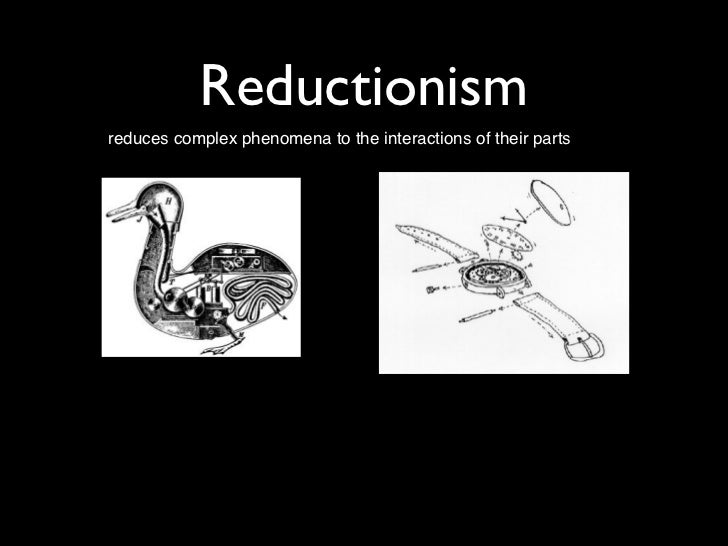 Splitting and simplification are common operations which scientists routinely apply. Splitting can be applied to almost anything, but it is most commonly applied to the subject matter of scientific theories. Simplification is an operation that is applied to scientific theories themselves. In science, splitting subject matter up is sometimes given a technical name: reductionism.
Splitting and simplification are common operations which scientists routinely apply. Splitting can be applied to almost anything, but it is most commonly applied to the subject matter of scientific theories. Simplification is an operation that is applied to scientific theories themselves. In science, splitting subject matter up is sometimes given a technical name: reductionism.Reductionism has become a bizarrely unpopular part of science. The most common complaint is that splitting things up leads to a focus on the parts and ignoring their interactions. Sometimes it is emergent properties that reductionism supposedly neglects.
That gets us on to the topic of simplification. Simplification is another basic tool in the scientific toolkit. The most common associations for many scientists when they think of simplicity are Occam's razor and the parsimony principle. However these are the tip of the iceberg. Simple theories act as foundations for more complex theories. It is easy to make complex theories that completely explain data - the problem is that such theories are poor at making predictions. To get a good predictive theory you need to find smaller theories.
I would say more about the virtues of simplicity. However, Boyd and Richerson have a fine essay titled: Simple Models of Complex Phenomena: The case of cultural evolution The essay is targeted at anthropologists - who are often complexity worshippers. Simple theories are incorrect theories, they seem to think. Perhaps because so many of their colleagues are confused about the topic, Boyd and Richerson go to considerable lengths to argue the virtues of simplicity.
Many social scientists don't like simplification. They think accuracy is more important. Jonathan Haidt expresses this perspective here:
I'm actually a anti parsiomonist: I'm opposed to the pursuit of parsimony. I take Occam very literally. Let's pursue truth. If two theories are equally good at describing reality take the simplest - but don't pursue simplicity. Whoever made us didn't give a damn about simplicity, so stop pursuing simplicity in psychology.
This attitude is a confused one which fails to understand why scientists prioritize simplicity so highly.
Many of the complaints about reductionism are about simplification. The fear is that after splitting things up, interactions between the components will be ignored, or the diversity of the components will be neglected. Perhaps it should be stressed more that splitting and simplification are technically orthogonal operations.
As far as terminology goes, the term "reductionism" has some weak points - it is an "-ism" - like Mormonism and Catholoicism. The term "reductionism" sounds as though it denigrates that which it reduces. Reduce" doesn't mean "split" - so the term doesn't say what it means: it is confusing. Lastly, reductionism is jargon. I think I am going to start using the terms "splitting" and "simplification" instead.










No comments:
Post a Comment